英语语法错误经典例子(五)
考研英语作文写作最易扣分的语言错误(精选5篇)

考研英语作文写作最易扣分的语言错误(精选5篇)篇1:考研英语作文写作最易扣分的语言错误考研英语作文写作最易扣分的语言错误语言的准确性和多样性是写作中一个十分关键的考查点。
这就要求我们首先要保证语言的准确性,在准确的基础上就多样。
那么考生的写作中常犯的语言错误有哪些呢?下面将从词、句、段三个层面给大家分析考生常犯的错误,希望各位同学能够引以为戒。
考研英语中,写作部分是对考生能力的综合性的考查。
主要考查的是学生的语言基本功,逻辑思维能力以及文化素养等。
根据大纲中对大小作文评分侧重点的规定,大作文的评分重点在于“内容完整性、文章的组织连贯性、语法结构和词汇的多样性及语言的准确性”,应用文的评分侧重点在于“信息点的覆盖和内容的组织、语言的准确性、格式和语域的恰当,”我们可以看出,语言的准确性和多样性是写作中一个十分关键的考查点。
这就要求我们首先要保证语言的准确性,在准确的基础上就多样。
那么考生的写作中常犯的语言错误有哪些呢?下面将从词、句、段三个层面给大家分析考生常犯的错误,希望各位同学能够引以为戒。
首先,从词的层面来说,常见的问题包括:(1)词性使用错误。
比如“Some children study very diligent”,这句话中,diligent是形容词,不能修饰动词study,必须改为diligently 或者hard。
(2) 随意编造词汇。
在的作文中图画展示了两个残疾人互相搀扶,扔掉拐杖的画面。
有学生写到“Both of the two men need lamesticks”,显然,学生因为不记得“拐杖”的英语表达,自己生造了lamesticks 这个词。
实际上,可用来表达“拐杖”的意义的词很多,比如 stick, walking stick, staff, crutch, cane. 等。
实在不会,也可以用helping tools, exterior supports , walking aids, sticks that help them to walk等间接的表达方式,无论如何也不能编造单词,更不能用汉语拼音Guai Zhang。
英语语法错误分类(史上最全)

英语语法错误分类(史上最全)一.不一致(Disagreements)所谓不一致不光指主谓不一致,它还包括了数的不一致时态不一致及代词不一致等.例1.When one have money ,he can do what he want to .(人一旦有了钱,他就能想干什么就干什么.)剖析:one是单数第三人称,因而本句的have应改为has ;同理,want应改为wants.本句是典型的主谓不一致.改为:Once one has money ,he can do what he wants (to do) 二.修饰语错位(Misplaced Modifiers)英语与汉语不同,同一个修饰语置于句子不同的位置,句子的含义可能引起变化.对于这一点中国学生往往没有引起足够的重视,因而造成了不必要的误解.例1.I believe I can do it well and I will better know the world outside the campus.剖析:better位置不当,应置于句末.三.句子不完整(Sentence Fragments)在口语中,交际双方可借助手势语气上下文等,不完整的句子完全可以被理解.可是书面语就不同了,句子结构不完整会令意思表达不清,这种情况常常发生在主句写完以后,笔者又想加些补充说明时发生.例1.There are many ways to know the society. For example by TV ,radio ,newspaper and so on .剖析:本句后半部分"for example by TV ,radio ,newspaper and so on .”不是一个完整的句子,仅为一些不连贯的词语,不能独立成句.改为:There are many ways to know society ,for example ,by TV ,radio ,and newspaper.四.悬垂修饰语(Dangling Modifiers)所谓悬垂修饰语是指句首的短语与后面句子的逻辑关系混乱不清.例如:At the age of ten, mygrandfather died. 这句中"at the age of ten"只点出十岁时,但没有说明” 谁”十岁时.按一般推理不可能是my grandfather, 如果我们把这个悬垂修饰语改明确一点,全句就不那么费解了.改为:When I was ten, my grandfather died.例1.To do well in college, good grades are essential.剖析:句中不定式短语“to do well in college” 的逻辑主语不清楚.改为:To do well in college, a student needs good grades.五.词性误用(Misuse of Parts of Speech)“词性误用”常表现为:介词当动词用;形容词当副词用;名词当动词用等.例1.None can negative the importance of money.剖析:negative 系形容词,误作动词。
英语小作文语法错误例子
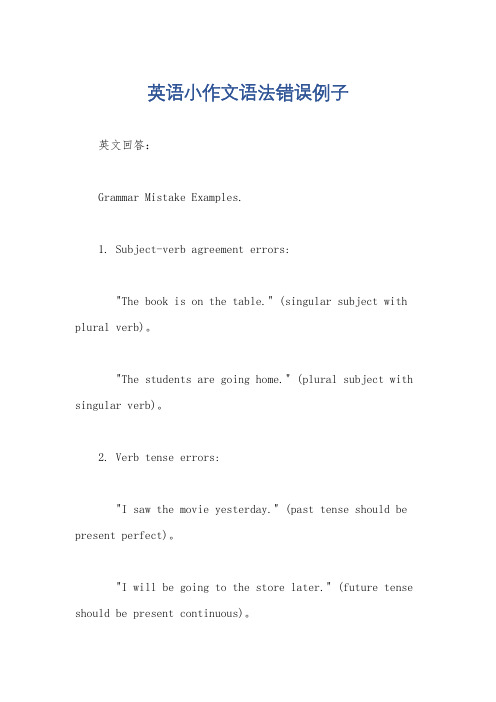
英语小作文语法错误例子英文回答:Grammar Mistake Examples.1. Subject-verb agreement errors:"The book is on the table." (singular subject with plural verb)。
"The students are going home." (plural subject with singular verb)。
2. Verb tense errors:"I saw the movie yesterday." (past tense should be present perfect)。
"I will be going to the store later." (future tense should be present continuous)。
3. Pronoun errors:"I gave the book to she." (incorrect pronoun case)。
"The dog and cat are playing with each other." (incorrect pronoun reference)。
4. Adjective and adverb errors:"The car is very fast." (incorrect use of adverb)。
"The book is more interesting than the movie." (incorrect use of comparative adjective)。
5. Preposition errors:"I went to the store at the street." (incorrect preposition)。
英语语法常见错误解析
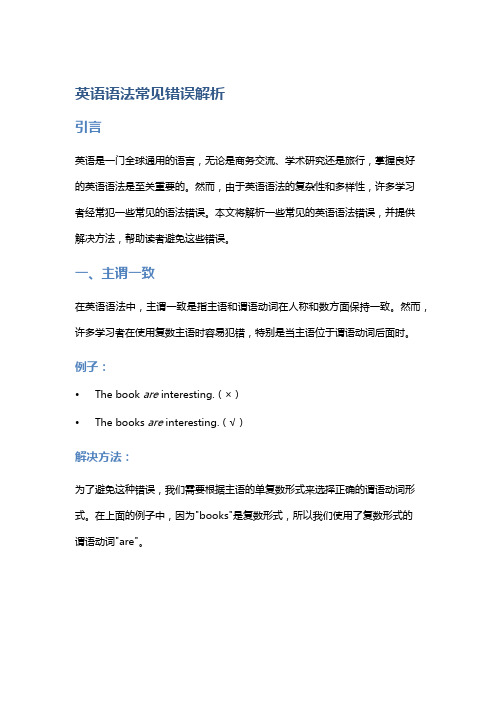
英语语法常见错误解析引言英语是一门全球通用的语言,无论是商务交流、学术研究还是旅行,掌握良好的英语语法是至关重要的。
然而,由于英语语法的复杂性和多样性,许多学习者经常犯一些常见的语法错误。
本文将解析一些常见的英语语法错误,并提供解决方法,帮助读者避免这些错误。
一、主谓一致在英语语法中,主谓一致是指主语和谓语动词在人称和数方面保持一致。
然而,许多学习者在使用复数主语时容易犯错,特别是当主语位于谓语动词后面时。
例子:•The book are interesting.(×)•The books are interesting.(√)解决方法:为了避免这种错误,我们需要根据主语的单复数形式来选择正确的谓语动词形式。
在上面的例子中,因为"books"是复数形式,所以我们使用了复数形式的谓语动词"are"。
二、冠词的用法错误冠词在英语语法中的使用是让很多学习者感到困惑的问题之一。
有时候,学习者会忽略冠词的使用,导致语法错误。
例子:•I want to buy a iPhone.(×)•I want to buy an iPhone.(√)解决方法:使用冠词时需要根据后面的词的发音来选择正确的冠词。
在上面的例子中,由于"Iphone"这个词的发音以元音音素开头,所以我们需要使用冠词"an"。
三、动词时态错误英语的动词时态非常丰富,但是许多学习者在使用时态时容易出错。
一个常见的错误是将动词的过去分词形式与助动词"have"以及"has"错误地搭配使用。
例子:•I have went to the park yesterday.(×)•I have gone to the park yesterday.(√)解决方法:在这种情况下,正确的形式应该是"have gone"。
高考必考语法改错之系动词十大经典错误

• eat continue last remain • ⑤ ⑥ ⑦ continue ⑧ stay
• taste keep remain leave
系动词知识体系
系动词十大典型错误例析
【改错】高考链接 少be动词
Байду номын сангаас
1.CThhienya^eaangdear stokekdnomwe
everything about lots of questions.
were
注意! be eager to do …渴望做某事
系动词十大典型错误例析
【改错】高考链接 少be动词
2.kI’ndolwikemtoor^eyoaubropuet ny-ofurirencodu, anntrdy.get to
His hands feel coldly.
• 在英语中,某一动词是多义词,既有实义 动词用法,又有系动词用法。学生务必弄 清其二者区别。切忌把二者混为一谈,这 也是会考、高考常见考点。此类常见易混 词有:
• change listen look touch • ① turn ② hear ③ see ④
time.
注意! 注意:如果一个职位在一定
2)W时 名e期 词el内做ec由表te一语d h个、im人 宾m担 补o任 和nit时 同or, 位of这 语o个 时ur 表,cla示常ss职不. 位用的冠
词。
3)Mr.Hunter,captain of the team,loves
playing football.
练
being
系动词十大典型错误例析
【改错】
3.They gradually b_e_c_am__e to enjoy their
语法错误的英文

语法错误的英文语法错误用英文怎样表达,它的拼写是?下面是店铺给大家整理的语法错误的英文,供大家参阅!语法错误的英文grammatical mistake常见英语语法错误1、从句成份缺失Nowadays, many people believe that people who always telling the true things.修改为:people who always telling the true things are of reliability.点评:中国学生容易丢掉一些复合句中从句的某部分,需要加强对长复合句子的把握能力。
2、使动词当意动词用I frustrate about the phenomenon that nobody wants to help the poor.修改为:The phenomenon that nobody wants to help the poor frustrates me.或:The phenomenon that nobody wants to help the poor makes me frustrated.点评:frustrate是使动词,表示“使…沮丧”,“某事使我沮丧”应该表示为“sth. frustrates me”。
类似的易用错的使动词还有disappoint,surprise,distress,prepare,adapt,remind, concern等3、及物动词与不及物动词不区分My parents’ opinions usually influence to me.Everybody laughs him when he comes.修改为:My parents’ opinions usually influence me.Everybody laughs at him when he comes.点评:influence是及物动词,不需要加介词。
英语语法错误经典例子(五)
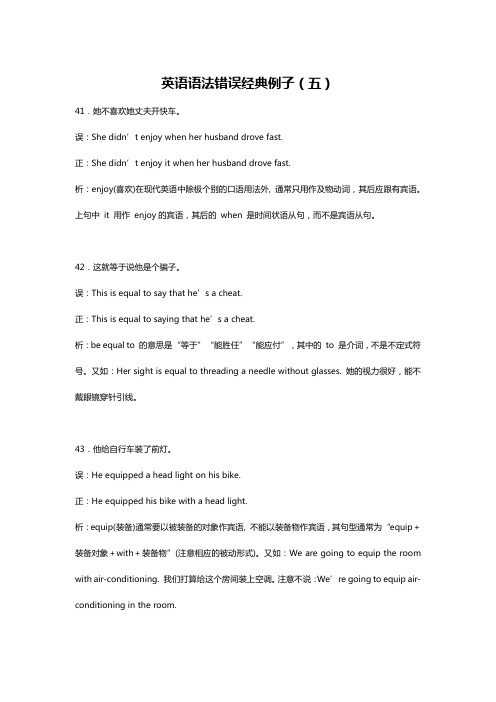
英语语法错误经典例子(五)41.她不喜欢她丈夫开快车。
误:She didn’t enjoy when her husband drove fast.正:She didn’t enjoy it when her husband drove fast.析:enjoy(喜欢)在现代英语中除极个别的口语用法外, 通常只用作及物动词,其后应跟有宾语。
上句中it 用作enjoy的宾语,其后的when 是时间状语从句,而不是宾语从句。
42.这就等于说他是个骗子。
误:This is equal to say that he’s a cheat.正:This is equal to saying that he’s a cheat.析:be equal to 的意思是“等于”“能胜任”“能应付”,其中的to 是介词,不是不定式符号。
又如:Her sight is equal to threading a needle without glasses. 她的视力很好,能不戴眼镜穿针引线。
43.他给自行车装了前灯。
误:He equipped a head light on his bike.正:He equipped his bike with a head light.析:equip(装备)通常要以被装备的对象作宾语, 不能以装备物作宾语,其句型通常为“equip+装备对象+with+装备物”(注意相应的被动形式)。
又如:We are going to equip the room with air-conditioning. 我们打算给这个房间装上空调。
注意不说:We’re going to equip air-conditioning in the room.44.他设法躲避惩罚。
误:He tried to escape from punishment.正:He tried to escape punishment.析:escape 表示逃避或躲避不愉快的事(如危险,处罚,不幸,灾难等),是及物动词,其后无需用介词。
四级语法常见错误总结

四级语法常见错误总结一、代词的一致性错误代词与其所代替的名词在性、数、人称上应保持一致。
常见错误包括:1. 主谓代词一致性错误:例子:Neither of the boys have finished their homework.改正:Neither of the boys has finished his homework.2. 主、宾语代词一致性错误:例子:Everyone should do what they can to protect the environment.改正:Everyone should do what he or she can to protect the environment.3. 名词所有格代词一致性错误:例子:The students should bring there books to his or her desk.改正:The students should bring their books to their desks.二、动词时态和语态错误1. 时态错误:学生常常在叙述过去事件时使用错误的时态,如将过去事件使用现在进行时等。
例子:Last night, I am going to the theater.改正:Last night, I went to the theater.2. 语态错误:例子:The tree was cut down by my father.改正:The tree was cut down by me.三、冠词误用1. 不必要的冠词使用错误:例子:I saw a interesting movie yesterday.改正:I saw an interesting movie yesterday.2. 缺少必要的冠词:例子:He is student.改正:He is a student.四、介词和动词搭配错误1. 使用错误的介词:例子:I am interested with learning English.改正:I am interested in learning English.2. 动词搭配错误:例子:She depends for me to help her.改正:She depends on me to help her.五、句子结构错误1. 并列句结构错误:例子:I like to watch movies, but I don't like swimming.改正:I like to watch movies, but I don't like to swim.2. 定语从句结构错误:例子:The book, that I borrowed it from the library, is very interesting.改正:The book, which I borrowed from the library, is very interesting.六、介词的位置错误介词通常应该放在它所修饰的名词或代词之后。
初学者常犯的英语语法错误

初学者常犯的英语语法错误英语是一门广泛应用的国际语言,许多人学习英语以便更好地沟通和获得更好的工作机会。
尽管这种语言通常被称为“容易学习的语言”,但它也充满了许多令初学者困扰的语法错误。
本文将讨论初学者常犯的英语语法错误,并提供有关如何避免这些错误的建议。
一、主谓不一致错误主谓不一致错误是许多初学者犯的常见语法错误之一。
在英语语法中,“主语”和“谓语”必须匹配。
例如,如果主语是单数,那么谓语动词必须是单数形式。
如果主语是复数,那么谓语动词必须是复数形式。
以下是一些常见的主谓不一致错误:错误例子:- 他们每天早上醒来后喝咖啡。
(主语:他们,谓语动词:喝咖啡,错误原因:主语是复数,但谓语动词却是单数形式)- 他的家人和他不想去那里。
(主语:他的家人和他,谓语动词:不想去那里,错误原因:主语是复数,但谓语动词却是单数形式)- 我的朋友每年都去度假。
(主语:我的朋友,谓语动词:去度假,错误原因:主语是单数,但谓语动词却是复数形式)- 我每天都锻炼身体。
(主语:我,谓语动词:锻炼身体,句子正确)- 他们喜欢看电影。
(主语:他们,谓语动词:喜欢看电影,句子正确)- 她的朋友都穿着漂亮的裙子。
(主语:她的朋友,谓语动词:都穿着漂亮的裙子,句子正确)二、时态错误时态错误也是初学者常犯的错误之一。
在英语语法中,时态是指动词所处的时间。
时态错误通常出现在动词的错用上。
以下是一些常见的时态错误:错误例子:- 我昨天去图书馆还书。
(错误原因:动词的时态应该是“借书”,因为“还书”是过去式,表示一种已经完成的动作,与句子主语“我”不符。
)- 我正在吃晚饭当电话响了。
(错误原因:正在进行的动作应该使用现在进行时态“正在吃晚饭”,而不是一般过去时态)- 如果我知道这件事我不会嫁给他的。
(错误原因:虚拟语气需要使用过去式“if I knew”,而不是“if I know”)- 我正在学习英语。
(正确使用现在进行时态)- 我今天早上去健身房。
英语语法错误经典例子(六)
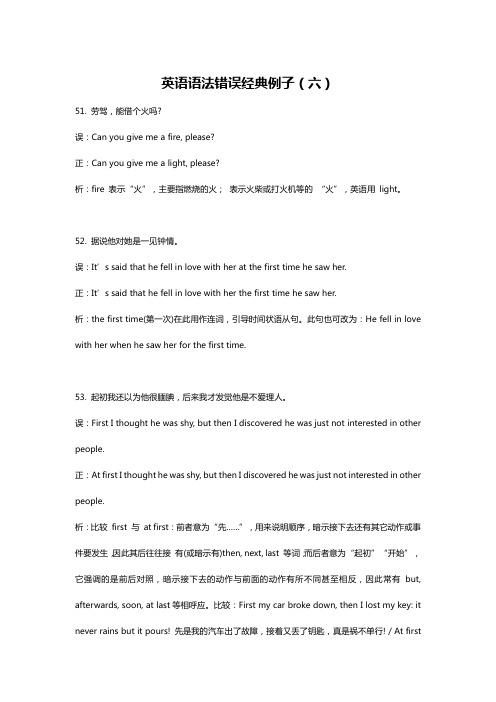
英语语法错误经典例子(六)51. 劳驾,能借个火吗?误:Can you give me a fire, please?正:Can you give me a light, please?析:fire 表示“火”,主要指燃烧的火;表示火柴或打火机等的“火”,英语用light。
52. 据说他对她是一见钟情。
误:It’s said that he fell in love with her at the first time he saw her.正:It’s said that he fell in love with her the first time he saw her.析:the first time(第一次)在此用作连词,引导时间状语从句。
此句也可改为:He fell in love with her when he saw her for the first time.53. 起初我还以为他很腼腆,后来我才发觉他是不爱理人。
误:First I thought he was shy, but then I discovered he was just not interested in other people.正:At first I thought he was shy, but then I discovered he was just not interested in other people.析:比较first 与at first:前者意为“先……”,用来说明顺序,暗示接下去还有其它动作或事件要发生,因此其后往往接有(或暗示有)then, next, last 等词;而后者意为“起初”“开始”,它强调的是前后对照,暗示接下去的动作与前面的动作有所不同甚至相反,因此常有but, afterwards, soon, at last等相呼应。
比较:First my car broke down, then I lost my key: it never rains but it pours! 先是我的汽车出了故障,接着又丢了钥匙,真是祸不单行! / At firstthings went well, but later on we ran into trouble. 起初事情进展得很顺利,但后来我们遇到了困难。
常见英语语法错误

常见英语语法错误1.句子成分残缺不全We always working till late at night before taking exams.(误)We are always working /We always work till late at night before taking exams(正)We should read books may be useful to us. (误)We should read books which may be useful to us. (正)2.句子成分多余This test is end, but there is another test is waiting for you. (误)One test ends, but another is waiting for you. (正)The driver of the red car was died on the spot. (误)The driver of the red car died on the spot. (正)3.主谓不一致Someone/Somebody think that reading should be selective. (误)Some think that reading should be selective. (正)My sister go to the cinema at least once a week. (误)My sister goes to the cinema at least once a week. (正)4.动词时态、语态的误用I was walking along the road, and there are not so many cars on the street. (误)I was walking along the road and there were not so many vehicles on the street. (正)We have little time to read some books which we interest. (误)We have little time to read some books in which we are interested. (正)I am a student who has studying in the college for two years. (误)I have been studying in the college for two years(正)5.词类混淆It is my point that reading must be selectively.(误)In my opinion, reading must be selective. (正)Honest is so important for every person. (误)Honesty is so important for everyone. (正)The old man was hit by a car when he across the street.(误)The old man was hit by a car when he was crossing the street. (正)6.名词可数与不可数的误用Too much tests are d isadvantage for students’ study. (误)Too many tests are disadvantageous to students. (正)In modern society, people are under various pressures(误)In modern society, people are under various kinds of pressure. (正)7.动词及物与不及物的误用The traffic accident was taken place at the junction of two highways. (误)The traffic accident took place at the junction of two highways. (正)Because of his excellent performance, the boss rose his salary. (误)Because of his excellent performance, the boss raised his salary. (正)8.介词to和不定式符号的混淆Too many tests will do harm to cultivate our independent thinking. (误)Too many tests will do harm to the cultivation of our independent thinking. (正)All these contributed to solve the serious problem. (误)All these contributed to the solution to the serious problem. (正)9.情态动词的误用It may not good to our health. (误)It may be not good to our health. (正)They should spent much time. (误)They should spend much time. (正)10. There be句型的误用There exists some new problems such as being dishonest. (误)There exist/arise some new problems such as being dishonest. (正)There are many way to solve the tuition and fees of college education. (误)There are many ways to raise the money for the tuition and fees for college education. (正)1.动宾搭配不当We must pay attention to it and make solutions to the problem. (误)We must pay attention and find a solution to the problem. (正)It also may help you to make success. (误)It may also help you succeed/obtain your goal. (正)2.根据中文逐字硬译If someone’s family situation is not well, he can apply for loan to bank. (误)If one’s family is not well off, he can apply to the bank for a loan. (正)Let alone touch the outside world of campus/keep a good body health(误)Let alone get in touch with the world outside of the campus/keep fit(正)上面这些错误比较典型、集中,请大家务必要注意,其他的错误,如单词拼写、大小写、标点符号的误用等,可谓千姿百态,无奇不有,在此就不一一列举。
高中语法错误的典型案例与改正方法

高中语法错误的典型案例与改正方法语法是语言的基础,准确运用语法规则对于高中学生来说至关重要。
然而,由于知识储备不够,许多高中生在写作和口语表达过程中常常出现语法错误。
本文将以典型案例为例,介绍一些高中语法错误的情况,并提供改正方法,帮助学生提高语法水平。
1.主谓一致错误主谓一致是英语语法中的基本规则之一,意味着主语和谓语动词在人称和数上应保持一致。
例如,错误的表达方式为:"Tom and his friends is going to the park."这句话中,谓语动词"is"应变为"are",以与复数主语"Tom and his friends"保持一致。
改正方法是,学生应该意识到主谓一致的规则,根据主语的单复数形式正确选择谓语动词。
2.时态错误时态是表示动作发生时间的形式,时态错误会导致表达不准确。
典型的时态错误包括:"I have go to the cinema yesterday."正确的表达方式应该是:"I went to the cinema yesterday."改正方法是,学生应该在句子中准确使用过去、现在和将来时态,根据句子中的时间状语或上下文来选择正确的时态。
3.冠词错误冠词是英语中常见的语法问题之一。
错误的使用冠词会导致句子含义模糊。
比如:"He is good cook."应改为:"He is a good cook."在这个例子中,漏掉了不定冠词"a",导致句子的意思不明确。
改正方法是,学生需要理解冠词的基本用法,并在适当的情况下使用定冠词、不定冠词或零冠词。
4.代词错误代词在英语中起到代替名词的作用,常常导致高中生的语法错误。
典型的代词错误包括:"They invited Mary and I to their party."正确的表达方式为:"They invited Mary and me to their party."在这个例子中,应该使用宾格代词"me"代替主格代词"I",因为它在句子中作为宾语。
理解中学生英语语法错误的七个常见例子

理解中学生英语语法错误的七个常见例子1. 主谓一致错误中学生在学习英语语法时,常常犯下主谓一致错误。
这种错误发生在主语和谓语动词之间,当主语是单数形式时,谓语也应该是单数形式;反之,当主语是复数形式时,谓语也应该是复数形式。
例如,他们经常犯下类似于“The boys is playing basketball”这样的错误,正确的应该是“The boys are playing basketball”。
2. 冠词错误另一个常见的错误是冠词的使用问题。
中学生在学习英语时,经常混淆a和an的使用,而忽视了单数和复数名词以及可数名词和不可数名词之间的差异。
例如,他们可能会错误地写成“an apple”而不是“a apple”,或者“a book”而不是“an book”。
3. 时态错误时态的错误也是中学生经常犯的语法错误之一。
时态错误包括混淆过去时、现在时和将来时,以及使用错误的助动词。
例如,他们可能会写成“I go to school yesterday”而不是“I went to school yesterday”,或者“I will went to the movie”而不是“I will go to the movie”。
4. 介词错误介词的使用也是中学生常见的语法错误之一。
他们经常搞混介词的正确用法,导致句子的意思不明确或者句子结构错误。
例如,他们可能会写成“I am go to school by bus”而不是“I go to school by bus”,或者“He is in the cinema”而不是“He is at the cinema”。
5. 句子结构错误中学生在构建句子时,也常常出现句子结构错误。
这种错误包括主谓宾语结构的混淆、从句的错误引导词以及动词形式的错误等等。
例如,他们可能会写成“Tom playing football in the park”而不是“Tom plays football in the park”,或者“I don't know why he is come late”而不是“Idon't know why he comes late”。
高中英语写作中常出现的十大语法错误
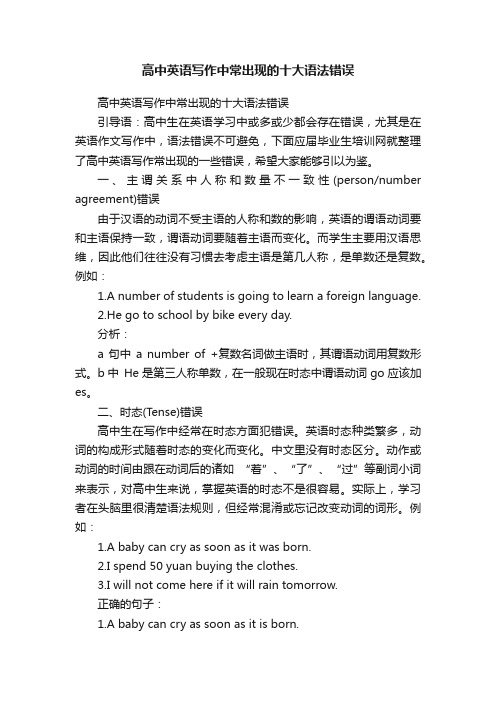
高中英语写作中常出现的十大语法错误高中英语写作中常出现的十大语法错误引导语:高中生在英语学习中或多或少都会存在错误,尤其是在英语作文写作中,语法错误不可避免,下面应届毕业生培训网就整理了高中英语写作常出现的一些错误,希望大家能够引以为鉴。
一、主谓关系中人称和数量不一致性(person/number agreement)错误由于汉语的动词不受主语的人称和数的影响,英语的谓语动词要和主语保持一致,谓语动词要随着主语而变化。
而学生主要用汉语思维,因此他们往往没有习惯去考虑主语是第几人称,是单数还是复数。
例如:1.A number of students is going to learn a foreign language.2.He go to school by bike every day.分析:a句中a number of +复数名词做主语时,其谓语动词用复数形式。
b中He是第三人称单数,在一般现在时态中谓语动词go应该加es。
二、时态(Tense)错误高中生在写作中经常在时态方面犯错误。
英语时态种类繁多,动词的构成形式随着时态的变化而变化。
中文里没有时态区分。
动作或动词的时间由跟在动词后的诸如“着”、“了”、“过”等副词小词来表示,对高中生来说,掌握英语的时态不是很容易。
实际上,学习者在头脑里很清楚语法规则,但经常混淆或忘记改变动词的词形。
例如:1.A baby can cry as soon as it was born.2.I spend 50 yuan buying the clothes.3.I will not come here if it will rain tomorrow.正确的句子:1.A baby can cry as soon as it is born.2.I spent 50 yuan buying the clothes.3.I will not come here if it rains tomorrow.分析:第一句是一个常识问题,应该用一般现在时态。
高考必考语法改错之with十大经典错误

cold and hungry是形容词,其 前不能用介词。
No.2 with改错第二大母题
【改错】
核心指数☆☆☆
(缺with )
难度指数☆☆☆☆☆
2. If this doesn’t work , bring in a friend that you feel comfortable, and have him or her help you. ^ with
__
_
注意!
介词with +名词、代词+分词 连词as+从句 With ______ production up by 60%, the company has had another excellent year.
No.4 with改错第四大母题
【改错】
核心指数☆☆
( with-by互改)
4. The room is lighted with __ by electricity.
天下第一介词—with十大经典错误例析 错中学 易掌握 印象深 永不忘
天下第一介词—with
with四大用法、一大结构
1、表示方式、手段或工具等时(=以,用),注意不要受汉语 意思的影响而用错搭配,如“用英语”习惯上用in English ,而不是with English。 2、比较with和as:两者均可表示“随着”,但前者是介词, 后接名词或代词;后者是连词,用于引导一个句子。 3、表示条件时,根据情况可与虚拟语气连用。 4、与某些抽象名词连用时,其作用相当于一个副词。 5 、复合结构“with+宾语+宾语补足语”是一个很有用的结构 ,它在句中主要用作状语,表示伴随、原因、时间、条件、 方式等;其中的宾语补足语可以是名词、形容词、副词、现 在分词、过去分词、不定式、介词短语等。
英语语法影响沟通的例子
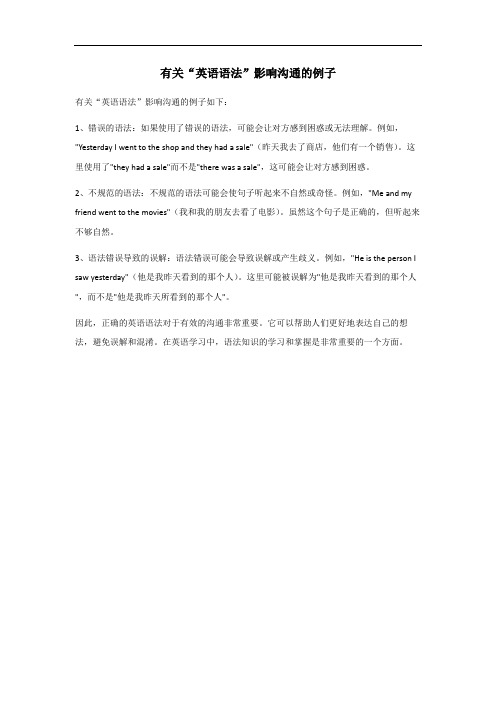
有关“英语语法”影响沟通的例子
有关“英语语法”影响沟通的例子如下:
1、错误的语法:如果使用了错误的语法,可能会让对方感到困惑或无法理解。
例如,"Yesterday I went to the shop and they had a sale"(昨天我去了商店,他们有一个销售)。
这里使用了"they had a sale"而不是"there was a sale",这可能会让对方感到困惑。
2、不规范的语法:不规范的语法可能会使句子听起来不自然或奇怪。
例如,"Me and my friend went to the movies"(我和我的朋友去看了电影)。
虽然这个句子是正确的,但听起来不够自然。
3、语法错误导致的误解:语法错误可能会导致误解或产生歧义。
例如,"He is the person I saw yesterday"(他是我昨天看到的那个人)。
这里可能被误解为"他是我昨天看到的那个人",而不是"他是我昨天所看到的那个人"。
因此,正确的英语语法对于有效的沟通非常重要。
它可以帮助人们更好地表达自己的想法,避免误解和混淆。
在英语学习中,语法知识的学习和掌握是非常重要的一个方面。
初三语法错误常见类型整理
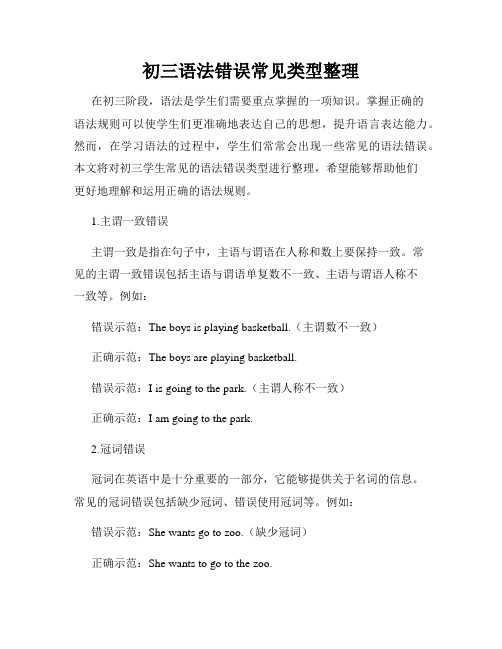
初三语法错误常见类型整理在初三阶段,语法是学生们需要重点掌握的一项知识。
掌握正确的语法规则可以使学生们更准确地表达自己的思想,提升语言表达能力。
然而,在学习语法的过程中,学生们常常会出现一些常见的语法错误。
本文将对初三学生常见的语法错误类型进行整理,希望能够帮助他们更好地理解和运用正确的语法规则。
1.主谓一致错误主谓一致是指在句子中,主语与谓语在人称和数上要保持一致。
常见的主谓一致错误包括主语与谓语单复数不一致、主语与谓语人称不一致等。
例如:错误示范:The boys is playing basketball.(主谓数不一致)正确示范:The boys are playing basketball.错误示范:I is going to the park.(主谓人称不一致)正确示范:I am going to the park.2.冠词错误冠词在英语中是十分重要的一部分,它能够提供关于名词的信息。
常见的冠词错误包括缺少冠词、错误使用冠词等。
例如:错误示范:She wants go to zoo.(缺少冠词)正确示范:She wants to go to the zoo.错误示范:I have a apple.(错误使用冠词)正确示范:I have an apple.3.时态错误时态是英语中非常重要的语法部分,它用来表达动作的发生时间。
常见的时态错误包括时态混淆、时态一致性错误等。
例如:错误示范:He will go to the cinema yesterday.(时态混淆)正确示范:He went to the cinema yesterday.错误示范:I am going to the park yesterday.(时态一致性错误)正确示范:I went to the park yesterday.4.动词形式错误动词是句子中最重要的谓语成分,其形式要与句子的主语保持一致。
常见的动词形式错误包括动词时态错误、动词的不规则变化错误等。
- 1、下载文档前请自行甄别文档内容的完整性,平台不提供额外的编辑、内容补充、找答案等附加服务。
- 2、"仅部分预览"的文档,不可在线预览部分如存在完整性等问题,可反馈申请退款(可完整预览的文档不适用该条件!)。
- 3、如文档侵犯您的权益,请联系客服反馈,我们会尽快为您处理(人工客服工作时间:9:00-18:30)。
英语语法错误经典例子(五)
41.她不喜欢她丈夫开快车。
误:She didn’t enjoy when her husband drove fast.
正:She didn’t enjoy it when her husband drove fast.
析:enjoy(喜欢)在现代英语中除极个别的口语用法外, 通常只用作及物动词,其后应跟有宾语。
上句中it 用作enjoy的宾语,其后的when 是时间状语从句,而不是宾语从句。
42.这就等于说他是个骗子。
误:This is equal to say that he’s a cheat.
正:This is equal to saying that he’s a cheat.
析:be equal to 的意思是“等于”“能胜任”“能应付”,其中的to 是介词,不是不定式符号。
又如:Her sight is equal to threading a needle without glasses. 她的视力很好,能不戴眼镜穿针引线。
43.他给自行车装了前灯。
误:He equipped a head light on his bike.
正:He equipped his bike with a head light.
析:equip(装备)通常要以被装备的对象作宾语, 不能以装备物作宾语,其句型通常为“equip+装备对象+with+装备物”(注意相应的被动形式)。
又如:We are going to equip the room with air-conditioning. 我们打算给这个房间装上空调。
注意不说:We’re going to equip air-conditioning in the room.
44.他设法躲避惩罚。
误:He tried to escape from punishment.
正:He tried to escape punishment.
析:escape 表示逃避或躲避不愉快的事(如危险,处罚,不幸,灾难等),是及物动词,其后无需用介词。
但若是表示从某体场所逃走、从管制或监禁中逃走、液体或气体从管中漏出等,均为不及物动词,可与介词from 连用。
如:Some gas is escaping from the pipe. 煤气管在漏气。
A lion has escaped from its cage. 有一只狮子从笼子里逃走了。
比较:He escaped prison. 他躲避了监禁。
(本该入狱但逃避了,即逃避了不愉快的事,及物) He escaped from prison. 他越狱了。
(已经入狱但逃走了,即从管制或监禁中逃走,不及物)
45.他除了身体不舒服外,每天都上图书馆。
误:He goes to the library every day except that he is not well.
正:He goes to the library every day except when he is not well.
析:except that和except when 均可后接句子,但两者在语义上有差别:即后者的when 含有“当……时候”的意思,前者则没有这层意思。
比较:I know nothing about him except that he is Paris. 我只知道他是巴黎人,其他的就什么都不知道了。
He never came except when he was in trouble. 除了(当他)遇到麻烦(的时候)以外,他从不来。
46.法官非常注意这一情况,即孩子在家里并不快乐。
误:The judge paid a lot of attention to that the child was unhappy at home.
正:The judge paid a lot of attention to the fact that the child was unhappy at home.析:按英语习惯,除极个别介词(如except, but 等)外,一般的介词之后均不能直接跟that 从
句。
如语义上需要接这类从句,则通常使用the fact that 这一结构。
注:在这类句型中,the fact 用作前面介词的宾语,其后that从句为修饰the fact 的同位语从句,用以说明the fact 的具体内容。
47.我们了解他的性格。
误:We are familiar to his character.
正:We are familiar with his character.
析:familiar(熟悉的)有以下两类用法须注意:一是表示某人熟悉某事物,此时通常只用作表语,且在其后连用介词with;二是表示某事物为某人所熟悉,此时可用作表语或定语,其后通常连用介词to。
比较:We are familiar with the saying. 我们熟悉这条格言。
The saying is familiar to us. 这条格言我们熟悉。
48.到目前为止,这工作很容易,但情况可能有变化。
误:So far the work is easy but things may change.
正:So far the work has been easy but things may change.
析:so far有两个主要意思:一是表示“到目前为止”,强调的是从过去持续到现在的一段时间,所以通常与现在完成时连用;另一个意思是表示“到这种程度或范围”,此时可根据情况选用时态,如:I can only help him so far. 我只能帮他到这种程度。
49. 我想笑,但是不敢笑。
误:I felt like to laugh, but I didn’t dare.
正:I felt like laughing, but I didn’t dare.
析:feel like 中的like 不是动词,是介词,所以其后只能接名词或动名词,不能接不定式。
feel like 的主要用法有“想要”“摸起来像”“(感到)像是……”,如:It feels like silk. 这东西摸起来像丝绸。
I feel like catching a cold. 我像是感冒了。
50. 每周推出数以百计的新唱片,但(其中)没有几张能进入每周流行榜。
误:Hundreds of new records are produced each week but a few (of them) get into the charts.
正:Hundreds of new records are produced each week but few (of them) get into the charts.
析:few 和a few均表示复数意义,few 表示数量很少或几乎没有,强调“少”,含有否定意义;a few 表示数量虽然少但毕竟还有,强调“有”,含有肯定意义。
比较:His theory is very difficult, and few people understand it. 他的理论很深奥,没有几个人能懂。
His theory is very difficult, but a few people understand it. 他的理论很深奥,但是有些人懂。
